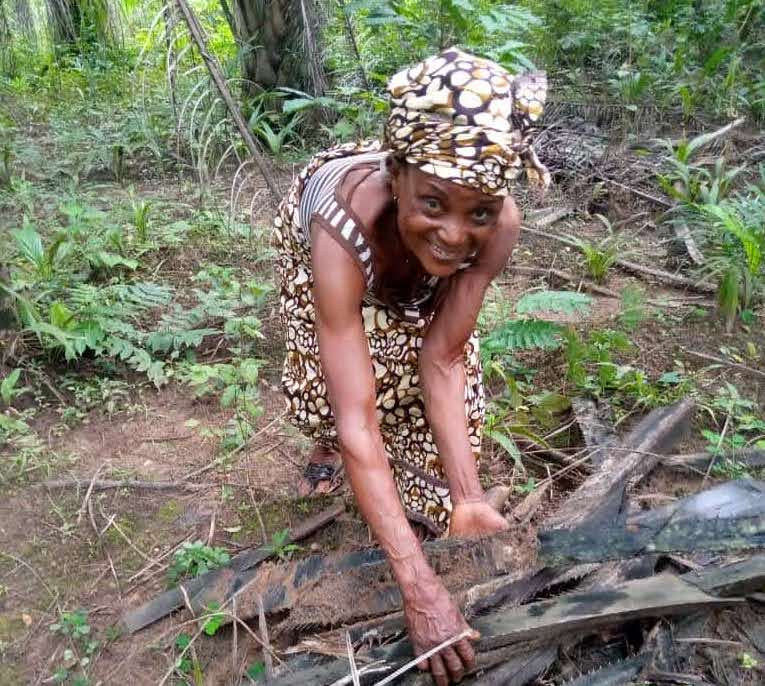Alice Agwu regained control of her late husband's land, where she now cultivates oil palm
In Nigeria, almost 80 percent of smallholder farmers operate from family lands, and by tradition, women are not entitled to own or inherit such lands. In the Oyen-Okpon community, the age-old custom made it impossible for Alice Agwu, a widow for 15 years, to inherit the two hectares of oil palm farm her husband left behind.
This situation has increased the burden of catering to the needs of her six children. She has been surviving on the crumbs her late husband’s male relatives pass to her after the harvest of fresh fruit bunches from the farm.
“It has been challenging for my children and me. For years, I provided labour services in my late husband’s oil palm farm to generate some income for the upkeep of my family. Sadly, however, I am not allowed to harvest ripe fruits on my own or take any of the by-products from the farm,” says Alice.
Besides Alice, this tradition has negatively impacted the economic wellbeing of many women, creating financial hardship for them.
The Solidaridad intervention
Solidaridad, as part of its gender-inclusivity strategy under the National Initiatives for Sustainable Climate-Smart Oil Palm Smallholders (NISCOPS) programme, pushed for the inclusion of women in oil palm farming to achieve sustainable development in the community.
Solidaridad trained the community leaders on gender issues. The elders (mainly men) learned from the engagements that allowing women to own and farm on family lands could improve the livelihood of families and the community at large.
To demonstrate this case, Solidaridad organized several capacity building sessions for women in the Oyen-Okpon community, beginning March 2019. They received training in best management practices covering proper ways of weeding (circle weeding), creating access paths, fertilizer application, and record-keeping of farm activities.
Women have been trained in best practices for oil palm farming
The application of best management practices by the women in the past one year resulted in improved yield. In some farms, the harvest of fresh fruit bunches increased from once monthly to twice. The boost in harvest resulted in improved incomes and better livelihood for the oil palm farmers, which impressed the community leaders.
Changing tradition to favour women
Impressed with the positive impact the programme had on women and the entire community, the elders directed families to allow the women to own and farm on family lands.
The Council of Chiefs, who oversee the traditional institution in the communities, declared at the beginning of the farming season this year that women are now allowed to own farm land, and that lands seized from widows, which originally belonged to their late husbands, should be returned to them.
“The NISCOPS programme has changed our perception about women owning farmlands. We are happy to make this declaration to encourage more women in our communities to be involved in oil palm farming,” says Sunday Obem, chief of Oyen-Okpon.
Community elders and men have been sensitized on the importance of gender inclusivity, especially with regards to farming
Women in Oyen-Okpon are now landowners
So far, about 35 widows have retrieved more than 50 hectares of oil palm fields belonging to their late husbands since the declaration by the chiefs. The women are now practising best management practices in their farms under the NISCOPS programme.
I now own and manage my late husband’s farm, which has been returned to me. Because I apply the knowledge acquired from Solidaridad through the best management training, I am confident of a bumper harvest and good income." -Alice Agwu
Alice’s achievement has encouraged more women to venture into oil palm farming. In some communities, women now receive reserved land quotas to support their farming.
Sixteen women have so far acquired about 60 hectares of fresh lands suitable for oil palm cultivation. All of them are determined to apply the best management practices learned from Solidaridad to maximize the gains from their lands.
“Women constitute much of the labour force in the agriculture sector in Nigeria. Given their crucial contribution to the country’s agriculture sector and economy in general, Solidaridad does not leave women out of our development interventions,” says Dr Samuel Ogallah, country technical lead and senior climate specialist for Solidaridad West Africa.
He says Solidaridad is committed to closing the gender gap and addressing inequalities through its various programmes.
The National Initiatives for Sustainable Climate-Smart Oil Palm Smallholders programme is funded by the Kingdom of the Netherlands. It seeks to increase the production of palm oil in a climate-smart way and to improve the livelihood of smallholder oil palm farmers in Nigeria and Ghana.
Read more about our work in Palm Oil.

